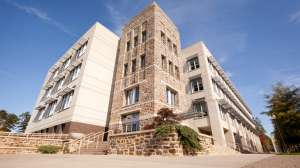Meet the Mentors: School of Medicine PhD Students Support Their Peers Through New Network
Graduate school is a unique time in a person’s life, filled with extraordinary opportunities and challenges. With this in mind, leaders in the School of Medicine’s Office of Biomedical Graduate Education have developed a new resource to provide incoming PhD students with social support as they begin this exciting new chapter. The Peer Mentor Network is a resource that connects 11 current PhD student volunteer mentors with the approximately 100 incoming PhD students who will be located in one of the School’s 17 departments in Fall 2021. The Peer Mentors directly engage with first-year students by co-leading small group discussions in the School’s BIOTRAIN 701 fall semester course, “Foundations in Professionalism for Biomedical Students,” and they will continue to provide mentoring throughout the first year.
“While the programs are very supportive of their individual cohorts, students often become so entrenched in their individual programs that they are less aware of their broader community,” said Beth Sullivan, PhD, associate dean for research training and a professor in the Department of Molecular Genetics and Microbiology. “Peer mentoring programs have been successful in Duke's undergraduate and medical student populations, so OBGE was keen to develop a centralized resource to equip senior PhD students with the skills to be effective mentors to first-year students who encounter many new, and often overwhelming, situations — classes, rotations, a new city, a new phase of life — when they arrive at Duke.”
Calla Telzrow, a fifth-year PhD student and administrative fellow in the Office of Biomedical Graduate Education, is working with Sullivan and OBGE Assistant Director of Trainee Development Kristin Russell to develop and implement the network. The peer mentors received leadership training in July 2021, drawn from the Leadership and Management in Action Program (L-MAP), a curriculum created at Washington University in St. Louis. The training is designed to introduce bioscience graduate students to the interpersonal and psychological foundations of leading teams and managing people.
“The curriculum is grounded in leadership and team dynamics that graduate students encounter in the research environment. It helps students to develop their own leadership and management styles and emphasizes that students can be leaders by influence even though they may lack a formal leadership title,” said Sullivan.
“As a graduate student myself, I am confident that an established peer mentoring program will improve the transition to graduate school, as well as the overall graduate student experience, for all Duke graduate students in the School of Medicine,” said Telzrow. “I am so excited to learn how we can continue to support and empower our students through this peer mentoring network.”



